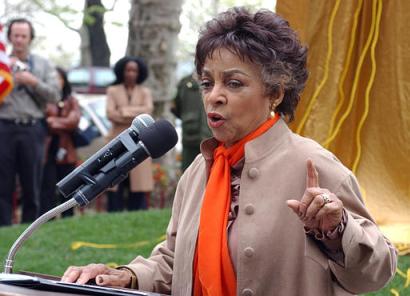 Growing up, Ruby Dee was able to self-define and
construct a safe space for herself at a young age. In the evenings, Dee and her
siblings would read aloud to each other poetry by Henry Wadsworth Longfellow,
William Wordsworth, and Paul Laurence Dunbar. When she was a teenager, Dee
submitted poetry to the New York Amsterdam News, a Black weekly newspaper; in Black Feminist Thought, Patricia Hill
Collins makes mention of the fact that “African-American women have
traditionally used family networks and Black community institutions as sites
for countering [controlling] images” (page 101).
Growing up, Ruby Dee was able to self-define and
construct a safe space for herself at a young age. In the evenings, Dee and her
siblings would read aloud to each other poetry by Henry Wadsworth Longfellow,
William Wordsworth, and Paul Laurence Dunbar. When she was a teenager, Dee
submitted poetry to the New York Amsterdam News, a Black weekly newspaper; in Black Feminist Thought, Patricia Hill
Collins makes mention of the fact that “African-American women have
traditionally used family networks and Black community institutions as sites
for countering [controlling] images” (page 101). In her later years, “Dee admitted that during those years she was a shy girl but that she always felt a burning desire to express herself” (NotableBiographies). In fact, her love of English and poetry motivated her to study the arts, and she decided to pursue acting. Her further inclusion in the arts was very important because “by advancing Black women’s empowerment through self-definition, these safe spaces help Black women resist the dominant ideology promulgated not only outside Black civil society but within African-American institutions” (page 101).
As a result of constructing a safe space for her self-definition, Dee “was talented enough and lucky enough to garner some of the best roles for black women in the 1950s and 1960s” (The History Makers). She was able to use her voice in the arts to share the stories of Black women in America, and the struggles of being a woman as a whole. Ruby became the first African-American actress to appear in major roles at the American Shakespeare Festival in Stratford, Connecticut in 1965; in 1968, she became the first African American actress to be featured on Peyton Place.




